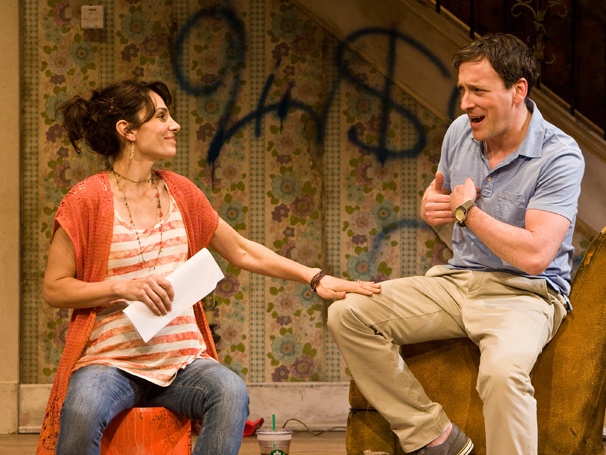Review: Clybourne
Park
 |
| Annie Parisse and Jeremy Shamos in Clybourne Park. |
While watching the first act of Clybourne Park, the new comedy by actor turned playwright Bruce
Norris, you might find yourself wondering exactly what all the fuss is
about. While well written and ably
performed, nothing about the play’s first hour seems to justify the mountains
of praised heaped upon the work since its 2010 Off-Broadway premiere, which
culminated in it winning of the Pulitzer Prize for Drama. But by the time you reach the end of the
howlingly funny second act, you realize that every word of Norris’ script was
necessary to create the non-stop barrage of belly laughs and pointed sociological
observations that make Clybourne one
of the most entertaining and thought-provoking evenings of the current Broadway
season.
Though set 50 years apart, both acts concern the impending
arrival of unwanted residents in the fictional Chicago neighborhood which gives
the play its title. Wanting to escape
the bad memories associated with their current home, 1950s suburbanites Bev (the
excellent Christina Kirk) and Russ (the always outstanding Frank Wood) prepare
to leave the all-white neighborhood of Clybourne Park in favor of greener
pastures. When it comes to light that
the house has been sold at a deep discount to an African-American family (most
likely the Youngers from Lorraine Hansbury’s seminal Raisin in the Sun, although that fact isn’t explicitly stated), Bev
and Russ find themselves being harassed by their “concerned” neighbor Karl,
played by a fantastic Jeremy Shamos.
While Norris’ writing and Shamos’ acting ensure there’s more
to Karl than just bigotry, it remains his overriding characteristic, and we are
clearly meant to sympathize with the unseen black family. Because of the distance provided by the
period setting, it’s easy for us to sit in judgment of Karl, making the first
act seem preachy and predictable despite its strong writing and convincing characterizations.
But then Act II turns everything on its head by jumping
ahead 50 years and reversing the races involved. Clybourne Park, now an all-black neighborhood
that has seen better days, is about to receive its first white residents in
ages. New owners Lindsey (Annie Parisse)
and Steve (Shamos again, even better than before) plan to remodel the now
historic building, prompting a meeting with the homeowners’ association that
eventually leads to veiled accusations of racism and gentrification.
Suddenly everything Norris wants to say becomes crystal
clear, and you realize you had to sit through Act I to fully appreciate how far
we have and haven’t come as a supposedly progressive society. Norris expertly illustrates how even when
talking about racism we don’t actually discuss it, since none of the characters
really listen to what the others are saying, and all of the most racist
comments come from characters voicing what they think is the subtext behind
someone else’s words. The second act is
about everyday people who say occasionally racist things, and Norris forces us
to ask the question, “Does that make them racist?” The play offers no easy answers, making it
all the more engaging.
The cast, who have been with the show since it’s
Off-Broadway premiere, is uniformly excellent.
They all imbue their characters with a quirky specificity that adds
volumes to the show’s charm without becoming grating or irksome, and everyone
manages to create two fully realized people over the course of the
evening. The aforementioned Annie
Parisse accomplishes the most drastic transformation – from a deaf housewife
into a new aged “progressive” – with particular flair, and threatens to steal
the show with her especially hilarious work in Act II. Her Lindsey is a masterful satire on modern
racism masquerading as liberalism, and yet Parisse plays her role without a
hint of judgment on Lindsey’s increasingly misguided-if-well-intentioned
worldview.
Making her Broadway debut, Crystal A. Dickinson offers a
fascinating look into the way modern racism is often a two-way street. Her Lena devolves from a well-spoken
individual with valid points into a vindictive, passive-aggressive antagonist
who constantly invokes what has become colloquially known as “the black
card.” Her self-satisfied smugness as
she gets under Lindsey and Steve’s skin is an excellent illustration of how any
minority can take their righteous indignation too far, actually undermining
their own cause in the name of advancing it.
(Dickinson also gets the biggest laugh of the evening with a joke that
is, to put it mildly, extremely off-color.)
By the end of Clybourne
Park, Norris has certainly earned his Pulitzer. With a script that is simultaneously
entertaining and intellectually stimulating, he leaves the audience with a lot
to digest. Along with the expert cast
and superb direction by Pam MacKinnon’s (whose contributions cannot be
underestimated), Norris’ script leaves you feeling satisfied and actually
excited to go home and discuss the show with friends. If that isn’t a hallmark of great theatre,
then I don’t know what is.
No comments:
Post a Comment